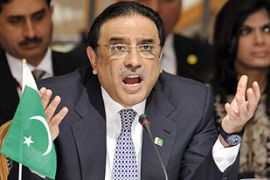Pakistan corruption amnesty expires
As amnesty covering President Zardari expires, scores of officials may be prosecuted.

| FROM THE BLOGS | |||
|
Zardari’s office said the president would be prepared to fight any charges against him.
“These cases were all made by two hostile governments and they were politically motivated cases not just against the president but many other political leaders,” Farahnaz Ispahani, a spokeswoman, said.
Weakened Zardari
Zardari’s presidential immunity prevents him from being prosecuted while in office. But the supreme court could choose to challenge his eligibility for the post since the 2007 amnesty decree by Pervez Musharraf, the former president, was never formally approved by parliament.
Many of the people covered by the amnesty are members of Zardari’s People’s Party and prosecution of them could further weaken him.
|
“Even if the law cannot throw him out, the public pressure will make it very difficult for him to survive.” Syed Pirzada, political analyst |
The president, who already spent several years in jail for corruption, has lost support as Pakistan struggles with Taliban violence, a recession and stalled efforts on reform.
Syed Pirzada, a political analyst, told Al Jazeera that there was pressure from the Pakistani people to scrap the amnesty as it was seen as encouraging and legitimising corruption.
He said that despite the presidential immunity, Zardari and his entire political leadership will be facing “a very tough time”.
“This immunity is not being enjoyed by the rest of the leadership… As long as Zardari stays in office, the issue will continue to haunt him,” Pirzada said.
“Even if the law cannot throw him out, the public pressure will make it very difficult for him to survive.”
Transferring responsibilities
As Zardari faced the expiration of the amnesty, he relinquished command of the country’s nuclear arsenal on Friday.
The decision was the result of a Supreme Court ruling aimed at reversing the 2007 imposition of emergency rule by Musharraf, who seized power in a 1999 military coup.
The responsibility to oversee the national nuclear capabilities was transferred to Yousuf Raza Gilani, the prime minister.
“Transferring the chairmanship of the National Command Authority to the prime minister is a giant step forward to empowering the elected parliament and the prime minister,” Farhatullah Babar, a presidential spokesman, said in a statement.
But Wajid Shamsul-Hasan, the Pakistani High Commissioner to the United Kingdom, told Al jazeera that the transfer did not mark a dramatic change.
“Actually control over nuclear assets has always been the [job of] the president, the prime minister and the army chief, so this is not a new thing if he has accommodated the prime minister – he was always there,” he said.
Zardari also reissued 27 other Musharraf-era ordinances and told Express News TV that he was likely to give away his powers to dissolve parliament and appoint services chiefs by the end of this year.
Analysts said the move signalled Zardari’s willingness to shed powers as part of a compromise that would enable him to keep his job.
“It appears to be a self-defence and survival strategy,” Rasool Bakhsh Rais, a political science professor at Lahore University of Management Science, said.
US-backed deal
Musharraf’s amnesty list was part of a US-backed deal to allow Zardari’s late wife, Benazir Bhutto, a former Pakistani prime minister, to return from exile in 2007 and run for office safe in the knowledge she would not be dogged by corruption allegations.
The US and other Western powers supported the bid by Bhutto, who was seen as a secular and pro-Western politician.
But Bhutto, who was forced from her post twice in the 1990s because of alleged corruption, was killed by a suicide bomber in December 2007 shortly after she returned to Pakistan.
Zardari took over as co-chairman of her party and was elected president in September 2008 by federal and regional legislators.
